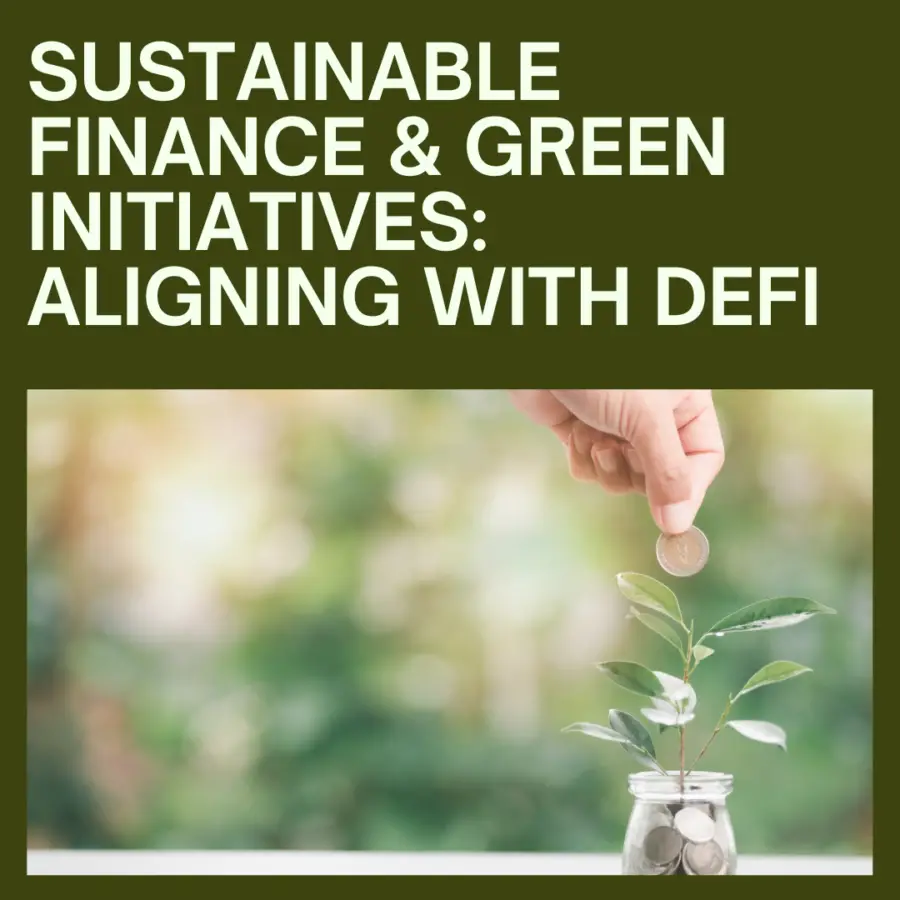Decentralized Finance (DeFi) has garnered attention for its transformative potential in the financial landscape, and its alignment with sustainable finance and green initiatives presents a promising avenue for positive impact. Let’s explore how DeFi can contribute to sustainable finance and support environmentally conscious initiatives.
1. Decentralized Governance for Sustainability:
- Community-Driven ESG Decision-Making: DeFi platforms can adopt decentralized governance models, allowing the community to participate in Environmental, Social, and Governance (ESG) decision-making. This inclusivity ensures that sustainability initiatives align with the values of the DeFi community.
2. Carbon-Neutral Blockchain Networks:
- Promoting Sustainable Blockchains: DeFi projects can choose to operate on blockchain networks with a commitment to sustainability. Platforms leveraging carbon-neutral or energy-efficient blockchains contribute to the broader goal of reducing the environmental impact of decentralized finance.
3. Green Lending and Borrowing Protocols:
- Incentivizing Eco-Friendly Practices: DeFi lending and borrowing protocols can introduce incentives for eco-friendly projects. Implementing green finance criteria in loan issuance and offering reduced interest rates for sustainable initiatives encourage environmentally conscious practices.
4. Tokenizing Green Assets:
- Unlocking Access to Sustainable Investments: DeFi platforms can tokenize green assets, making them more accessible to a global audience. From renewable energy projects to carbon offset initiatives, tokenization facilitates investment in sustainable assets, promoting environmental stewardship.
5. Smart Contracts for Transparent Impact Measurement:
- Traceability and Accountability: Smart contracts in DeFi can be designed to transparently track the impact of investments on sustainability metrics. This ensures accountability and allows participants to assess the environmental footprint of their financial activities.
6. Green Staking and Yield Farming:
- Aligning Incentives with Sustainability: DeFi protocols can introduce green staking and yield farming programs, where users are rewarded for supporting environmentally friendly projects. This aligns financial incentives with sustainable practices, fostering a more eco-conscious DeFi ecosystem.
7. Carbon Offsetting Initiatives:
- Supporting Carbon Offset Projects: DeFi projects can allocate a portion of their revenue to support carbon offset initiatives. This contribution aids in neutralizing the carbon footprint associated with blockchain transactions, demonstrating a commitment to environmental responsibility.
8. Social Impact Loans and Microfinance:
- Empowering Sustainable Entrepreneurship: DeFi can facilitate social impact loans and microfinance programs, supporting sustainable entrepreneurship in underserved communities. These initiatives empower individuals to pursue environmentally friendly businesses with financial backing from the DeFi ecosystem.
9. Eco-Friendly Oracle Networks:
- Reliable Sustainability Data Feeds: DeFi platforms rely on oracles for real-world data. Implementing oracle networks that prioritize sourcing sustainability-related data ensures the accuracy of ESG metrics used in decision-making processes.
10. Partnerships with Green Initiatives:
- Collaboration for Collective Impact: DeFi projects can forge partnerships with environmental organizations and green initiatives. Collaborative efforts amplify the impact of both financial and sustainability goals, fostering a synergistic relationship between DeFi and green initiatives.
11. Education and Awareness Campaigns:
- Promoting Green Finance Literacy: DeFi platforms can contribute to sustainable finance by educating their users about the environmental impact of financial activities. Raising awareness fosters a culture of responsible and sustainable financial practices within the DeFi community.
12. Incentivizing Renewable Energy Usage:
- Encouraging Eco-Friendly Infrastructure: DeFi projects can actively support and incentivize the use of renewable energy sources in blockchain infrastructure. This commitment contributes to the overall reduction of the environmental footprint associated with decentralized finance operations.
Conclusion: Toward a Sustainable DeFi Future
DeFi’s integration with sustainable finance represents a crucial step toward building a financial ecosystem that prioritizes environmental responsibility. By implementing eco-friendly practices, supporting green initiatives, and fostering community engagement, DeFi has the potential to play a pivotal role in shaping a sustainable and inclusive financial future. As the DeFi landscape continues to evolve, its alignment with green initiatives stands as a testament to the transformative power of decentralized finance in driving positive change on a global scale.





